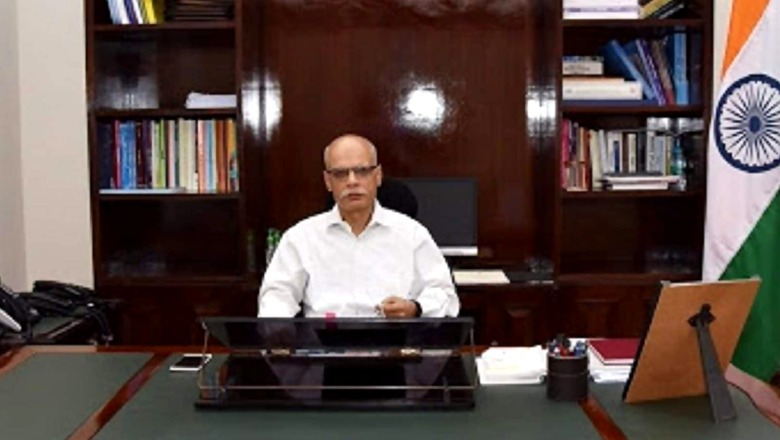
views
.
The government is expecting a “very, very robust” tax revenue in the current fiscal on the back of better-than-expected corporate sector performance, Revenue Secretary Tarun Bajaj said on Wednesday. Acknowledging that high GST rates are impacting the automotive sector, Bajaj said the GST Council would look at solutions to bring down rates which are very high, take out certain items from the tax-exempt category and correct the inverted duty structure.
“When I look at the current first quarter, the results have started coming and (tax) revenues have also started coming. The first advance tax is over, the TDS date is coming and going, I see a very, very robust tax revenue that is coming. “It is not that we have increased the taxes, or we have become more intrusive and we are coming to you asking to pay more taxes… the happy thing behind this is, perhaps the corporate sector is doing better than what we had anticipated it to. So, it is a very good thing for the economy,” Bajaj said at a CII annual session here.
The net direct tax collection in the April-June quarter of the current fiscal stood at over Rs 2.46 lakh crore, as against over Rs 1.17 lakh crore collected during the same period last fiscal (2020-21). Net Indirect Tax (GST and Non-GST) revenue collection in the June quarter of current fiscal was at Rs 3.11 lakh crore.
Net GST collection during the quarter was over Rs 1.67 lakh crore, which is 26.6 per cent of the budget estimate of Rs 6.30 lakh crore for full 2021-22 fiscal. The net GST collection includes Central GST + Integrated GST + Compensation cess. With regard to Goods and Services Tax (GST), Bajaj said there are a lot of items on which tinkering of tax rates might be needed, but there is a need to first stabilise the regime.
“On tax rates, I quite agree when you talk of the automotive sector. You are talking about two-wheelers, but I would say on the four-wheelers we not only charge 28 per cent, but also charge cess which is much more and as I see it, it will continue for a few more years. “All that has a negative impact on the industry. I acknowledge that, but I don’t know how to solve that issue,” Bajaj said.
He further said that although GST rates have come down at macro level, there was a need to look at solutions to bring down rates which are very high. “Rates have come down at macro level, yes, in a few sectors they may have gone up. But we have to look at solutions to bring down rates which are very high and take out certain items which are under exempted items, inverted duty structures, we need to do that and I’m sure, in the coming GST council meeting when we give this agenda, I am sure we will be able to get those things,” the Secretary added.
Asking private companies to invest more, Bajaj said animal spirit is missing from the corporate sector. “I don’t see private investment happening that much… for a sustained and long-term growth of the economy we want you people to come forward to invest, manufacture, start services and please tell us what is it that you require from us,” Bajaj said at the CII annual session.
He further added that, “one message that I have given to my officers here is don’t look at every penny. I’m okay to lose a pound if the economy gives me 10 pounds. That is the attitude that I would say the revenue department would be working and should be working on that.”
Last week, the government brought in a bill, which seeks to nullify retrospective tax demands raised on companies. The bill proposes to scrap the tax rule that gave the tax department power to go 50 years back and slap capital gains levies wherever ownership had changed hands overseas but business assets were in India. The 2012 legislation was used to levy a cumulative of Rs 1.10 lakh crore of tax on 17 entities, including UK telecom giant Vodafone, but substantial punitive action was taken only in the case of Cairn.
The Taxation Laws (Amendment) Bill, 2021 seeks to withdraw tax demands made using a 2012 retrospective legislation to tax the indirect transfer of Indian assets and also refund the amount paid in these cases without any interest. On raising tax to GDP ratio, Bajaj said hiking rates to increase tax collection is not a solution and instead the tax-base has to be expanded to bring more people under the tax net.
He said in India, unfortunately, there are only certain segments of people that are in the tax net and I think that is one of reasons why most of the taxes are coming from certain classes or categories of taxpayers. “The increase in tax buoyancy in current year is also as a result of certain quiet steps taken by I-T department,” he said adding that the government is trying to rope in a large part of informal sector, or non-corporate and non-salaried sector by bringing in some of their transaction or businesses into focus and trying to capture that.
“The very fact that now we are matching the GST return with ITR is making a lot of them pay taxes. That is the reason I was saying that without raising tax rates, tax buoyancy is up. “I am actually looking forward to expanding that effort. I don’t want to tax the corporate sector which already pays taxes in the country, and contributes a major part of taxes in the country,” he added.
Read all the Latest News, Breaking News and Coronavirus News here.



















Comments
0 comment